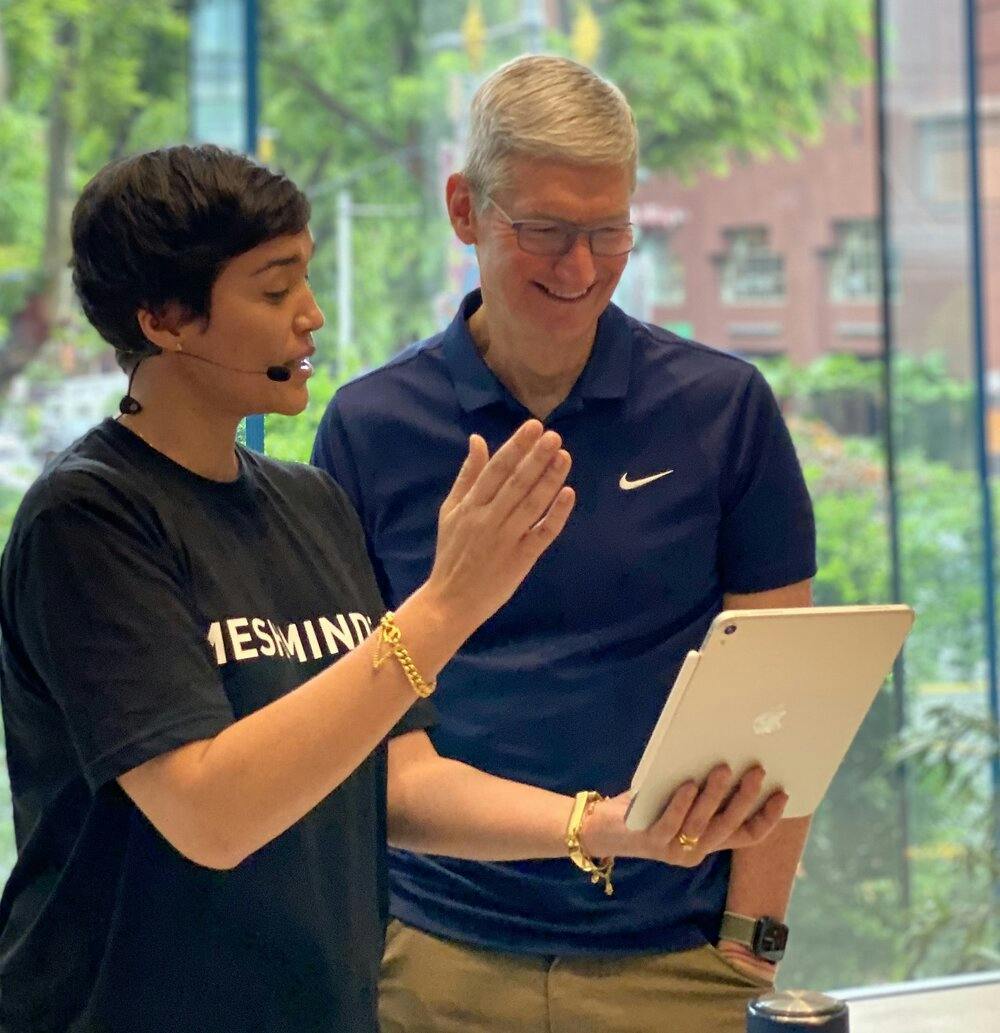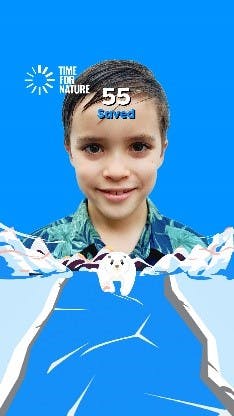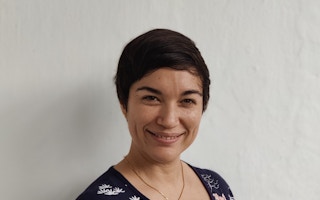Kay Vasey was born with the lush jungles of Brunei as her backyard. A love of nature came to her early, and sea turtle conservation camps were a feature of her youth.
To continue reading, subscribe to Eco‑Business.
There's something for everyone. We offer a range of subscription plans.
- Access our stories and receive our Insights Weekly newsletter with the free EB Member plan.
- Unlock unlimited access to our content and archive with EB Circle.
- Publish your content with EB Premium.
But it was the urban jungle where she started her career, as a media and technology lawyer. While in London, the Briton spotted a trend that captured her imagination: big tech companies like Google and Facebook partnering with artists.
Recognising the potential of technology as a force for good, and having moved to Singapore, Vasey founded MeshMinds in 2018. MeshMinds invests in artists that use creative digital techologies to tell sustainability stories, working in partnership with UN Environment Programme (UNEP). “I realised technology can be harnessed to create new products to make the world a better place,” says Vasey.
In this interview with Eco-Business, Vasey talks about her transition from successful lawyer to creative technology entrepreneur, why she loves being a mentor, and what Apple CEO Tim Cook once said to her.
“
This job opened my eyes to the lengths some companies go to to hoodwink the public about their sustainability efforts..
What inspired you to start MeshMinds?
MeshMinds’ values are based on art and technology for good. I realised that technology can be harnessed to create new products to make the world a better place. A position as the head of arts in the British Council after my time as a lawyer also allowed me to bring UK artists over to Singapore to collaborate with artists here. Starting MeshMinds is the result of my experiences to date in my life and career.
What made you decide to centre sustainability around MeshMinds?
I have always been in nature. When I was old enough to travel, I started getting involved in environment-based volunteer work trips. And when I had children, I realised that to have some semblance of a liveable planet for them, we need to act now. We cannot continue this wild, unbridled consumption.
I feel that the only way is going to happen is through education. I am no artist, but I can empower artists by giving them the tools they need to complement their skills to blend creativity and technology and tell stories about the importance of protecting our planet. The reason we use AR is to create hidden narratives within original art pieces. AR has the power to evoke empathy through interaction, bringing the artwork to life. It acts like another canvas.
What is your role as chief connecting officer at MeshMinds?
My job is to understand people and help connect them accordingly. I talk to technology companies about their new products, and then I think of which artist’s style best lends itself to that technology. And finally, to select which UN Sustainable Development Goal (SDG) this project is going to fall under. The UN comes to us with different briefs and we connect the right artist and tech company to do the best job. A project that we did to increase awareness of the destructive practices of fast fashion was with DBS Bank called Fashion Slowdown AR. The interactive game involves participants blinking to keep clothing out of the landfill.
How did your partnership with the UN start?
It was through an Eco-Business event. When we began in 2018, we had no partnerships. After hosting a show, MeshMinds 1.0, at ArtScience Museum, I asked our very first intern, Laura Barrera Vera, to attend an Eco-Business photography exhibition to get to know people who are passionate about sustainability. She met the deputy regional director of United Nations Environment Programme (UNEP), Isabelle Louis. Laura introduced our company to her. Coincidentally, I was going to a technology conference in Bangkok the following week and Isabelle was there too. I turned up at the UN Headquarters in Bangkok, walked into a room with five people and walked out that day with a deal. Within 24 hours we had become partners. When we started MeshMinds, I never in my wildest dreams thought we could become partners with the UN.
Do you have any career mentors?
My former boss when I became a freelance tech lawyer in England, Bradley Theobald. He was born with a condition where he could not use his arms or legs and is permanently in a wheelchair. He became a hotshot lawyer in London before leaving and starting on his own. I had children at the time, and he was the first person who enabled me to become a stay-at-home lawyer. I would seek his feedback and instead of saying it’s all wrong, he would annotate and teach me as I went along. He made it easy for me to become a good lawyer. He is the most helpful person I have ever come across. Since then, I have never dwelt on my insecurities and just give it my all.
Is this why you become a mentor for Female Founders & SheLovesTech?
Yes. I genuinely love helping and talking to people. I want to know what your painpoints in life are and where my ideas can help. My favourite question I get asked is, “who do you know who?” I will scour my little book in my head and connect people. Sometimes it takes one person meeting that one right person and having that one life-changing conversation.
What’s been the proudest moment of your career?
Two things. The first is being selected to present at the UN’s SEA of Solutions week for our project in partnership with ArtScience Museum, CleanSeas AR, in November 2019. I had 10 minutes to address a room full of ministers, business leaders and environmentalists from across Asia Pacific at the UN’s headquarters in Bangkok.

Kay Vasey and Tim Cook at the CleanSeas Exhibition at Apple
The second was being selected by Apple to meet Tim Cook [the CEO]. We have a team of Apple consultants at MeshMinds, where we bring creativity to the masses using the latest Apple products to tell global stories from a local perspective focused on the UN Sustainable Development Goals. While Tim Cook was visiting Singapore, we gave a presentation on how children can make plastic fish as part of the CleanSeas project. I told him about what we were doing that day, and his response was: “This is exactly what we want to see Apple technology being applied for.” It was amazing. Apple has been a great partner of ours in terms of standing behind our art and tech for good mission.
What’s the hardest thing about your job?
Juggling being a mother to my kids and a leader to my team of youths at MeshMinds. It is also a challenging time for us now, working from home. The team loves being together, at the office; we riff off each other and chuck ideas around. We always keep the line of communications open and make sure everyone is okay. We continue to adapt by using online collaboration tools, and find ways to keep morale going.
What’s the best piece of advice you could give someone starting out in sustainability?
Surround yourself with people with similar interests. I personally think Linkedin is helpful. It is a global directory of all the people working in different industries. If sustainability is your thing, do your research.
Also, find a good mentor. Reach out on Linkedin or join Facebook groups. People are helpful across this industry and are willing to share. You must keep trying—even when you don’t hear back. It doesn’t mean people don’t care, it’s just that sometimes they are a bit time-poor, or they could be saving the planet in their own way.
Where do you think the main sustainability knowledge gaps are among students now entering the workforce?
There needs to be more hardcore teaching and guiding using case studies about how technology is being harnessed to further sustainability efforts, and we need to accelerate that. Students should be aware that a career in sustainability is not “all green and fluffy”. It is still an emerging area and there is a lot of work to be done to get people in government, corporates, NGOs and the public on board together, acting together as one.
What’s the one thing you wish you knew before you started out in sustainability?

The Time for Nature AR game launched for World Environment Day
I did not know the extent of greenwashing. This job opened my eyes to the lengths some companies go to to hoodwink the public about their sustainability efforts. It is a difficult pill to swallow. To avoid this before doing a project for a company, we would always double check with the UN if it is a potential greenwashing scenario.
Tell us about your latest projects
We have just launched a reality game on Instagram and Facebook that invited people to Run for Nature in support of this year’s theme for World Environment Day 2020. This game invites players to raise their voices and pledge to build back better for people and the planet. The game is targeted at everyone; especially future change-makers. The idea is to empower people to get behind the message that it is Time for Nature.















